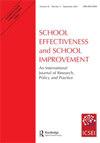A comparison of value-added models for school accountability
IF 2.8
3区 教育学
Q1 EDUCATION & EDUCATIONAL RESEARCH
引用次数: 4
Abstract
ABSTRACT School accountability systems increasingly hold schools to account for their performances using value-added models purporting to measure the effects of schools on student learning. The most common approach is to fit a linear regression of student current achievement on student prior achievement, where the school effects are the school means of the predicted residuals. In the literature, further adjustments are usually made for student sociodemographics and sometimes school composition and “non-malleable” characteristics. However, accountability systems typically make fewer adjustments: for transparency to end users, because data are unavailable or of insufficient quality, or for ideological reasons. There is therefore considerable interest in understanding the extent to which simpler models give similar school effects to more theoretically justified but complex models. We explore these issues via a case study and empirical analysis of England’s “Progress 8” secondary school accountability system.学校问责制增值模型的比较
摘要:学校问责制越来越多地要求学校对其表现负责,使用旨在衡量学校对学生学习影响的增值模型。最常见的方法是拟合学生当前成绩与学生先前成绩的线性回归,其中学校效应是预测残差的学校平均值。在文献中,通常会对学生的社会人口统计学进行进一步调整,有时还会对学校构成和“非可塑性”特征进行调整。然而,问责制通常很少进行调整:为了最终用户的透明度,因为数据不可用或质量不足,或者出于意识形态原因。因此,人们对理解更简单的模型在多大程度上与理论上更合理但更复杂的模型产生了相似的学校效应非常感兴趣。我们通过对英国“进步8”中学问责制的案例研究和实证分析来探讨这些问题。
本文章由计算机程序翻译,如有差异,请以英文原文为准。
求助全文
约1分钟内获得全文
求助全文
来源期刊

School Effectiveness and School Improvement
EDUCATION & EDUCATIONAL RESEARCH-
CiteScore
6.60
自引率
0.00%
发文量
23
期刊介绍:
School Effectiveness and School Improvement presents information on educational effectiveness, practice and policy-making across primary, secondary and higher education. The Editors believe that the educational progress of all students, regardless of family background and economic status, is the key indicator of effectiveness and improvement in schools. The journal strives to explore this idea with manuscripts that cover a range of subjects within the area of educational effectiveness at the classroom, school or system level, including, but not limited to: •Effective pedagogy •Classroom climate •School ethos and leadership •School improvement and reform programmes •Systemwide policy and reform
 求助内容:
求助内容: 应助结果提醒方式:
应助结果提醒方式:


